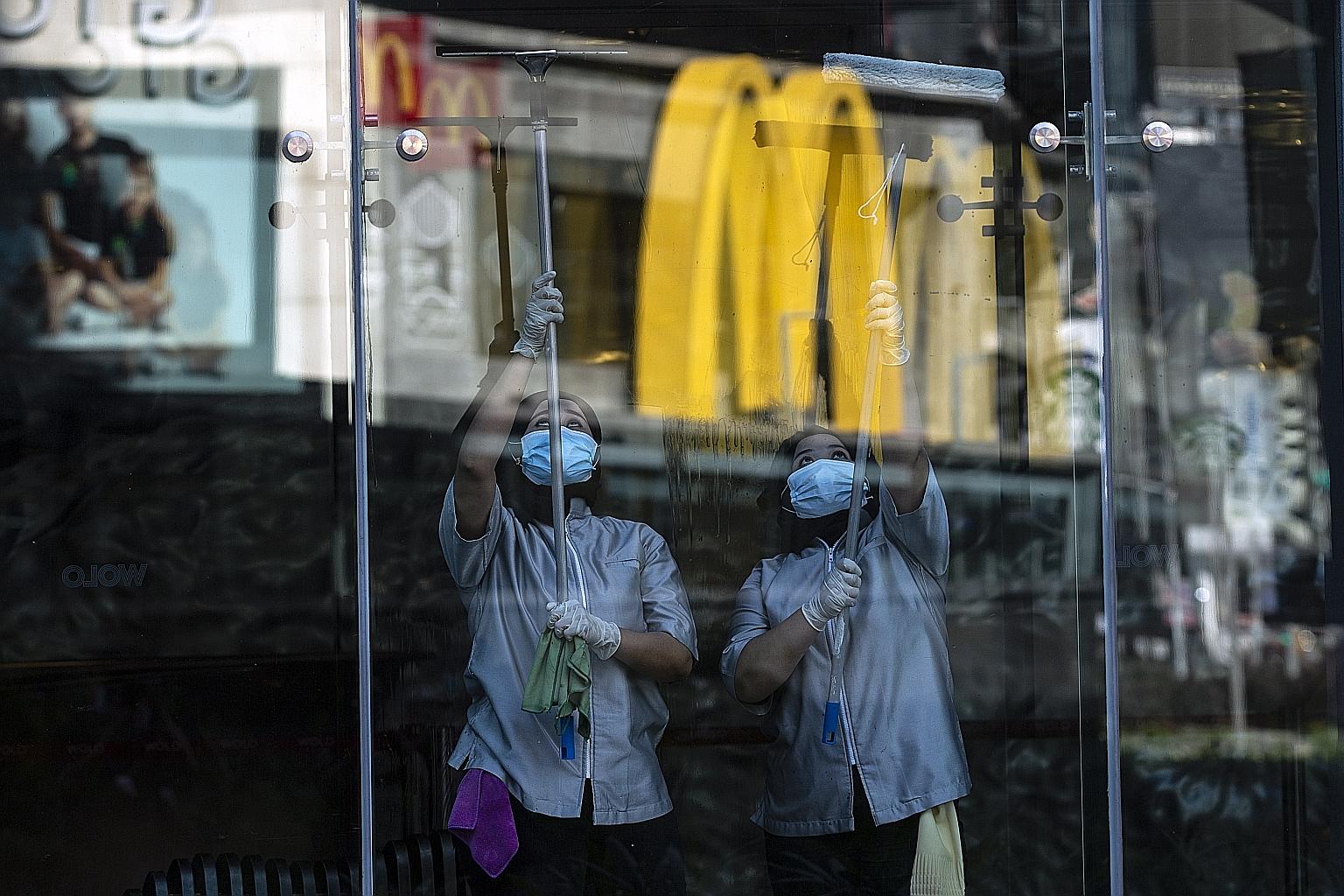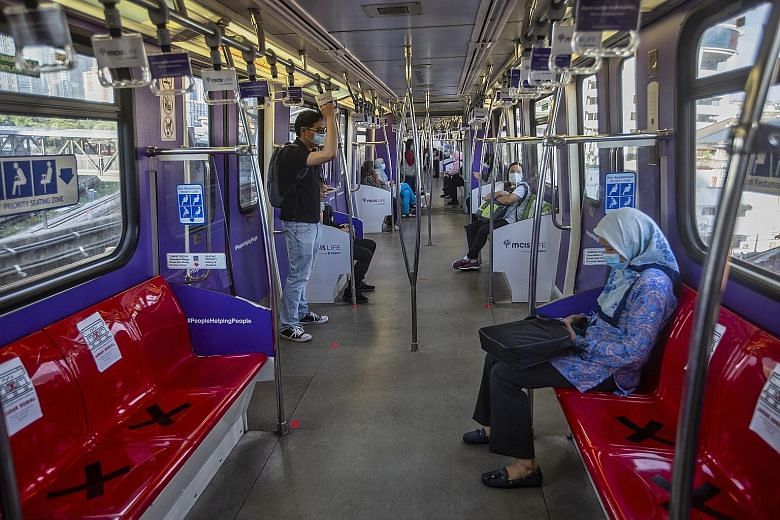Coronavirus: Normal life resuming in Malaysia, but cautiously
Many remain indoors for fear of contracting virus; some eateries stick with takeouts
Sign up now: Get insights on the biggest stories in Malaysia

Workers clean a shop's glass panel in Kuala Lumpur on May 4, 2020.
PHOTO: EPA-EFE
Some workers went back to their offices, joggers hit the streets and a few restaurants welcomed diners again as Malaysia began easing coronavirus controls yesterday after nearly seven weeks, and tries to revive its flagging economy.
But the fear of contracting Covid-19 appears to be keeping many other Malaysians indoors, even though most businesses and malls which have been shuttered for 47 days under the movement control order (MCO) are now allowed to reopen, provided social distancing and contact tracing measures are adhered to.
Those who did venture out of their homes and used public transport had their temperatures taken and were reminded to comply with physical distancing, with red tape marking places where commuters were supposed to stand on platforms and inside trains.
A spokesman for public transport service provider RapidKL told The Straits Times: "There were fewer commuters than what we expected."
Traffic volume in the city was up 30 per cent yesterday compared with Sunday, said Kuala Lumpur traffic investigation and enforcement head Zulkefly Yahya.
All MCO roadblocks in the city have also been removed, he was quoted as saying by the Bernama news agency.
But despite what the government calls "conditional MCO", Malaysia's borders including the land crossings linking the state of Johor with Singapore remain shut, except for returning citizens, permanent residents and expatriates.
Malaysia's airports are servicing limited domestic flights only.
Schools remain shut, with large social gatherings and mass worship still banned.

Though people can now dine at restaurants if they follow healthcare guidelines, many places are continuing to stick to takeaway service and online orders only, including fast-food chain McDonald's.
Workers at three eateries in the suburb of Setiawangsa told ST that they will not be accepting diners for now. "Our restaurant only serves takeaway food and does not provide in-store meal service... We do this to keep our customers and employees healthy," read a notice at the Al Bidayah Indian restaurant.
-
Borders still shut to tourists
Malaysia's borders will remain closed to tourists despite the government allowing most business to operate again from yesterday.
Malaysian citizens, permanent residents and expatriates returning from overseas are required to undergo a health examination on arrival and will be quarantined for 14 days in centres set up by the government.
Under rules implemented last week, the Malaysian High Commission in Singapore will issue only 400 permits daily for land crossings to ensure a smoother transition to quarantine facilities.
Starting on April 27, Malaysians who wished to return home from the Republic by land, using the Causeway and Second Link, have to obtain an entry permit.
Applicants for the permit must e-mail stmsg@mhc.org.sg at least two days before travelling.
At least 241 quarantine centres are in operation.
Nine of the 13 states in Malaysia have, meanwhile, rejected the federal government's call to reopen most businesses.
The country's richest state, Selangor, said it will not allow restaurants to offer dine-in services.
Sabah Chief Minister Shafie Apdal said the state would maintain the existing curbs, originally meant to be in place until next Tuesday.
"Our decision to maintain the MCO is to check on the spread of the virus in the state and to protect the people," he said in a statement on Sunday.
Penang Chief Minister Chow Kon Yeow said the state will only fully reopen businesses on May 13.
Responding to the snub by these states, International Trade and Industry Minister Mohamed Azmin Ali, the most senior Cabinet minister after Prime Minister Muhyiddin Yassin, said yesterday that everyone should "remain united and strengthen our collaboration towards our economic sustainability, securing our livelihoods and the well-being of the people".
"Should the state governments refuse to cooperate in implementing Act 342, which has been gazetted into law enforceable throughout the country, the state governments may face the possibility of legal action from various parties, particularly the industry players," he said in a statement.
The widespread caution is perhaps justified.
While Malaysia is showing signs of improvement on the virus front, with 55 new cases recorded yesterday, the authorities have warned that they will not hesitate to impose shutdowns in areas if new clusters of infection emerge.
For now, people like avid jogger Julie Goh, 50, are happy to take the opportunity to go for a run for the first time in over a month.
"I'm very grateful for being able to run after 47 days of zero physical activity outdoors," she said.


